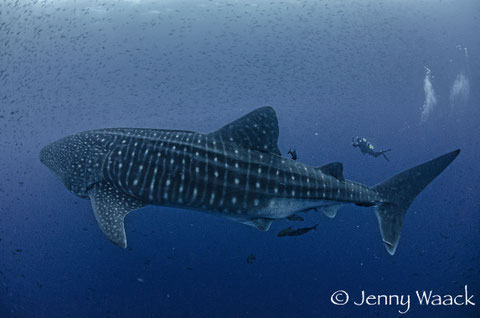Citizen Science Expeditions
Engage. Discover. Conserve.
Join our Citizen Science Expeditions and play a vital role in shark research and conservation efforts. Under the guidance of an onboard shark scientist, you will participate in hands-on research projects that contribute to the understanding and preservation of these magnificent creatures. This isn't just diving—it's diving with a purpose.
Galapagos Citizen Science Expeditions
Why Dive in the Galapagos Islands?
Diving in the Galapagos Islands is a once-in-a-lifetime opportunity for experienced divers seeking extraordinary underwater adventures. The Galapagos is renowned for its breathtaking marine life, offering encounters with majestic whale sharks, vast schools of hammerhead sharks, and vibrant coral reefs teeming with unique species. The islands' remote location and rich biodiversity create an underwater world unlike any other, where every dive reveals something new and awe-inspiring.
Whether you're exploring volcanic underwater landscapes or swimming alongside some of the ocean’s most iconic creatures, the Galapagos promises an unforgettable dive experience that will leave you eager to return. For those looking to embark on the ultimate diving journey, a liveaboard in the Galapagos is the perfect choice.
Why Choose Galapagos Shark Diving?

At Galapagos Shark Diving, we offer more than just a dive—we provide an unforgettable experience that blends exploration, education, and conservation.
- Expert-Led Expeditions: Dive alongside renowned shark scientists like Jonathan R. Green, Simon J. Pierce, Sofia Green, and Jenny Green, who bring their extensive knowledge and passion for marine biology to every expedition.
- Become a Shark Ambassador: Contribute directly to shark conservation by learning how to collect and share valuable data, making a global impact every time you dive.
- Support Shark Research: Every dive supports the Galapagos Whale Shark Project, with a portion of your booking going directly to this crucial research.
- Engaging Presentations: Deepen your understanding of marine life through daily onboard presentations covering Galapagos biodiversity, shark conservation, and the latest research updates.
- Intimate Diving Experience: With groups capped at 15 passengers, we ensure personalized attention and a high-quality diving experience tailored to your interests.
- Travel Responsibly: Our Eco Dive Tours are designed to minimize environmental impact and emphasize respectful interactions with wildlife.
- Multilingual Support: We offer translation services in English, German, Spanish, and French on selected trips, making our expeditions accessible to a global audience.
- Personalized Service and Expertise: With years of experience in the Galapagos, our team is dedicated to crafting tailor-made experiences that align with your diving goals while ensuring safety and sustainability.
Join us on an expedition where adventure meets conservation. Your journey with Galapagos Shark Diving is not just a dive—it’s a commitment to protecting our oceans for future generations.
The Itineraries
The 8-day Itinerary
Find the detailed itineraries of the Galapagos Citizen Science Expeditions HERE!
Tuesday
Morning: Santa Cruz - Baltra Airport
Afternoon: Santa Cruz - Baltra Island (1 check dive)
Wednesday
Morning: Cape Marshall (2 dives)
Afternoon: City of Mantas (1 dive)
Thursday
Morning: Darwin's Arch (2 dives)
Afternoon: Darwin's Arch (2 dives)
Friday
Morning: Darwin's Arch (2 dives)
Afternoon: Wolf Island (1 dive + 1 night dive)
Saturday
Morning: Wolf Island (2 dives)
Afternoon: Wolf Island (1 dive)
Sunday
Morning: Punta Vivente Roca (1 dive)
Afternoon: Cape Douglas (1 dive)
Monday
Morning: Cousin's Rock (2 dives)
Afternoon: Santa Cruz - Highlands & Giant Tortoises
Tuesday
Morning: Baltra Airport depart or continue with land extension
The Ship
The boat offers a wide diversity of dive opportunities:
- It sails to WOLF & DARWIN, the HOTSPOT for Hammerhead & Whale Shark Diving!
- It visits dive sites for Molas, Penguins, Giant Manta Rays and the famous Marine Iguana!
The vessel allows for a unique and unforgettable voyage in terms of the experience and quality of service and diving. Eight comfortable cabins each with private en-suite bathroom, hot and cold water, orthopedic mattresses, air conditioning which may be individually controlled and plenty of electrical outlets give you all you need.
Most time however will be spent out on deck enjoying the fresh air from on the afterdeck, sundeck and dive platform. Or you can relax in the lounge, enjoy a drink at the bar or have some quiet time working on photos, reading or just meditating.
The Price
In 2025:
$ 6,090 USD per person
In 2026:
$ 6,390 USD per person
The rate for 2025 is:
- 8-day Liveaboard is USD 6,090 per person based on double occupancy for the week
- Special 15-day Liveaboard is USD 12,290 per person based on double occupancy for the week
Following Extra/Add-ons are already included in the price:
- Expert-Led Expeditions: Dive alongside renowned shark scientists from the Galapagos Whale Shark Project, who bring their extensive knowledge and passion for marine biology to every expedition.
- 7-Night, 8-Day/ 14-Night, 15-Day Accommodations: Stay aboard the Aqua, featuring comfortable cabins and full-board service with freshly prepared meals.
- Engaging Presentations: Deepen your understanding of marine life through daily onboard presentations covering Galapagos biodiversity, shark conservation, and the latest research updates.
- Become a SharkAmbassador: Contribute directly to shark conservation by learning how to collect and share valuable data, making a global impact every time you dive.
- Support Shark Research: Every dive supports the Galapagos Whale Shark Project, with a big portion of your booking going directly to this crucial research.
- Multilingual Support: We offer translation services in English, German, Spanish, and French on selected trips, making our expeditions accessible to a global audience.
- Intimate Dive Experience: With groups capped at 15 passengers, we ensure personalized attention and a high-quality diving experience tailored to your interests.
- Travel Responsibly: Our Eco Dive Tours are designed to minimize environmental impact and emphasize respectful interactions with wildlife.
- Personalized Service: With years of experience in the Galapagos, our team is dedicated to crafting tailor-made experiences that align with your diving goals while ensuring safety and sustainability.
Available DATES
- 22 - 29 July 2025
- 29 July - 12 Aug 2025 (15 day trip)
- 12 - 19 August 2025
- 21 - 28 July 2026
- 28 July - 04 Aug 2026
- 04 - 18 August 2026 (15 day trip)
- 01 - 08 September 2026

Scientists/Researchers on Board
In 2025:
| 22 - 29 July 2025 | Jenny Y. Green & Sofia M. Green |
| 29 July - 12 August 2025 | Jonathan R. Green, Sofia M. Green & Jenny Y. Green |
| 12 - 19 August 2025 | Jenny Y. Green |
In 2026:
| 21 - 28 July 2026 | Jenny Y. Green & Sofia M. Green |
| 28 July - 04 August 2026 | Sofia M. Green & Jenny Y. Green & Kaush Subramaniam |
| 04 - 18 August 2026 | Jonathan R. Green & Jenny Y. Green |
| 01 - 08 September 2026 | Jenny Y. Green & Andy Fragola |

Join a Unique Dive Expedition with a Shark Expert and an Award-Winning Underwater Photographer
📅 Date: August 28 July – 04 August 2026
Experience an extraordinary diving adventure where you'll have the chance to dive alongside a shark expert and an award-winning underwater photographer, all while actively contributing to marine conservation.
📸 Underwater Photography for Conservation
Dive and learn with Kaush Subramaniam, an award-winning wildlife photographer, filmmaker, and conservation biologist (MSc) from the UK. Discover the art of underwater
photography, improve your skills in visual storytelling, and learn how powerful imagery can inspire action and awareness for ocean conservation.
🦈 Shark Research & Conservation
Meet Jenny Green, founder of Galapagos Shark Diving, who has dedicated her life to protecting marine ecosystems and leading whale shark research in the Galápagos. Learn
firsthand about current shark studies, the challenges of marine conservation, and how you can contribute as a diver to protecting our oceans.
This is a rare opportunity to combine your passion for diving, photography, and conservation—while exploring one of the most breathtaking marine ecosystems on Earth.

🌊 Exclusive Shark Conservation Dive Expedition
📅 September 01–08, 2026
Join us for this one-of-a-kind dive expedition, where you'll dive alongside leading shark experts, gain firsthand insight into shark research, and contribute to marine conservation efforts in the Galápagos Islands.
Meet the Experts on Board:
🦈 Andy Fragola – Marine biologist and shark conservationist, specializing in media awareness for ocean conservation. With a passion for storytelling, he bridges the gap between science and public awareness, inspiring action to protect marine life.
🌊 Jenny Green – Founder of Galapagos Shark Diving, dedicated to marine ecosystem protection and advancing shark research in the Galápagos. Her expertise offers unique insights into conservation challenges and how divers can actively contribute.
This is a rare opportunity to dive with experts, expand your knowledge of shark conservation, and explore the breathtaking underwater world of the Galápagos.
How we support Shark Conservation
Galapagos Shark Diving® offers dive trips to the world's most beautiful destinations and combines it with supporting marine conservation. The knowledge about sharks and training teaches how every diver can support conservation of endangered marine wildlife – with no science background needed. Every year only a few Shark Conservation Dive departures are offered in the best shark diving season and best months to dive in the islands of Galapagos and Cocos (July – October). Every dive trip is accompanied by shark scientists from the Galapagos Whale Shark Project, which is featured in the BBC Blue Planet II series.
For every diver the organization donates to the research of the Galapagos Whale Shark Project. This team is studying the unique population of adult whale sharks in the Galapagos. Find more information about the research project.
Each scientist will provide you with extensive knowledge about whale sharks and will teach you at the same time how you as a diver can support conservation of marine wildlife such as whale sharks, giant manta rays, sea turtles, other shark species, rays, molas, whales and other endangered animals – and that worldwide. You too can make a difference! Find out more about the programs on board
"In the end we will conserve only what we love; we will love only what we understand; and we will understand only what we are taught." (Baba Dioum)
This quote is very true as governments who decide about protection zones will only protect what they understand.
Every year millions of sharks are killed for their fins or caught as “bycatch” like many other marine wildlife like manta rays, turtles, sea lions amongst others. One way to ensure that a species may survive is to protect those areas key for their reproduction (mating, birthing, etc.). Until now only 5 % of the world oceans are truly protected! Furthermore, we don’t yet know precisely the areas where for example, whale sharks give birth or mate! In order to ensure that these gentle giants will not go extinct we need to identify such areas and create marine reserves and sanctuaries, in order to halt the population declining further. The Galapagos Islands could be one of the key locations where adult female whale sharks give birth and is already recognized as a vital nursery for other shark species in the Eastern Tropical Pacific Region. On our Shark Conservation Dive Trips we collect data which furthers our understanding of whale sharks and other marine wildlife and that helps us to promote Conservation through education and awareness.
If you would like to know what other divers say about travelling with us, check our review page where you can find travel reviews and experiences of our guest.







































